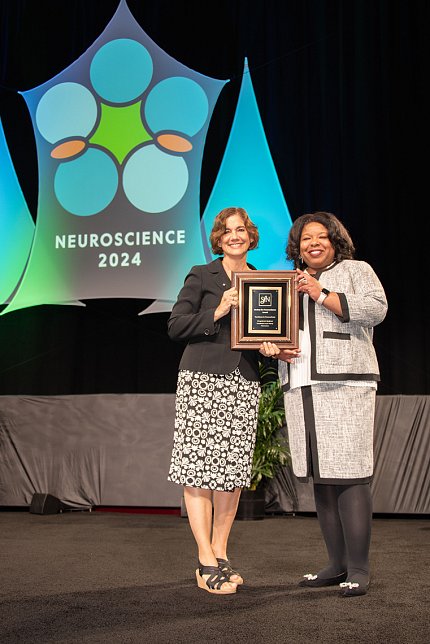Society for Neuroscience Lauds Jones-London

Photo: Society for Neuroscience
Dr. Michelle Jones-London, associate director of the National Institute of Neurological Disorders and Stroke (NINDS) Office of Programs to Enhance the Neuroscience Workforce (OPEN), recently received the Louise Hanson Marshall Special Recognition Award from the Society for Neuroscience (SfN).
The award honors individuals who have significantly promoted the professional development of women in neuroscience through teaching, organizational leadership and public advocacy.
Jones-London, one of two awardees of the 2024 Hanson Award, received the honor at the annual SfN meeting in October in Chicago. She was recognized for her exceptional contributions to the professional development of women through her diversity, equity and inclusion (DEI) efforts within the neuroscience community.
According to SfN, Jones-London has developed “an outstanding track record for identifying and removing the barriers that women encounter in science and for developing innovative strategies to promote entry, recruitment, retention and sustained advancement of women—especially neuroscientists and those from underrepresented communities—in biomedical and research careers.”
Her visionary leadership and research-based, data-driven approach have had a profound impact not only at NINDS, but across NIH with the NIH Blueprint for Neuroscience and the NIH BRAIN Initiative® and within the broader neuroscience community and have resulted in measurable DEI advances. Her strategy to enhance the diversity of NINDS-supported researchers has included interventions that connect programs across critical transition points and activities to help trainees develop professional skills and scientific networks and community to achieve their goals.
Noting the shortage of women in the BRAIN Initiative research areas, Jones-London created the first diversity K99/R00 mechanism at NIH, significantly increasing the representation of women in the field of neuroscience.
She also developed the “Why Survey,” in which 2,000 early-career scientists shared their viewpoints on career decisions, including what caused them to either leave or remain in academic research careers. Jones-London used their responses to design initiatives to provide financial support to female researchers during important transitions such as becoming parents or dealing with a serious illness. She also implemented professional development programs for women scientists, so they not only remain in the workforce but also succeed at every stage of their career.

Jones-London earned her Ph.D. in neuroscience from Pennsylvania State University College of Medicine. Following postdoctoral training in psychiatry at the University of Pennsylvania, in 2004 she came to NIH as an emerging leader fellow and worked on a variety of programs and initiatives across DHHS, including in NIH’s Center for Scientific Review, FDA’s Office of Women’s Health Science Program, and the Immediate Office of the Secretary’s Intergovernmental/Tribal Affairs Office. She joined NINDS as a program director in July 2006.
Throughout her career, Jones-London has held leadership roles in several NIH-wide efforts, including the NIH Blueprint and BRAIN Initiative ENDURE and DSPAN (F99/K00) programs, the BRAIN Initiative Diversity K99/R00, the NIH National Research Mentoring Network and the NIH Faculty Institutional Recruitment for Sustainable Transformation. In 2017, she helped create OPEN to direct diversity training and workforce development.
In her current role, she represents NINDS in DEI matters at all levels, and leads a team dedicated to advancing equity and inclusion across NINDS and the neuroscience workforce.
“We often give what we have been given, or what we wished we had received,” said Jones-London. “The work I have been able to perform is really a purpose-driven career and personal passion that allows me to pay forward the mentorship I have received and also build the communities and inclusive practices I wish had been around during my early journey as an African-American woman in neuroscience. During my training and leadership development, I often was the first or only, so it is a joy to make others feel seen and create spaces for belonging.”
